The MSI MEG X570 Godlike Motherboard Review: Thor's Flagship
by Gavin Bonshor on August 28, 2019 12:00 PM EST- Posted in
- Motherboards
- AMD
- MSI
- 10G Ethernet
- Ryzen
- PCIe 4.0
- Ryzen 3000
- X570
- X570 Godlike
- MEG
System Performance
Not all motherboards are created equal. On the face of it, they should all perform the same and differ only in the functionality they provide - however, this is not the case. The obvious pointers are power consumption, but also the ability for the manufacturer to optimize USB speed, audio quality (based on audio codec), POST time and latency. This can come down to the manufacturing process and prowess, so these are tested.
For X570 we are running using Windows 10 64-bit with the 1903 update as per our Ryzen 3000 CPU review.
Power Consumption
Power consumption was tested on the system while in a single ASUS GTX 980 GPU configuration with a wall meter connected to the Thermaltake 1200W power supply. This power supply has ~75% efficiency > 50W, and 90%+ efficiency at 250W, suitable for both idle and multi-GPU loading. This method of power reading allows us to compare the power management of the UEFI and the board to supply components with power under load, and includes typical PSU losses due to efficiency. These are the real world values that consumers may expect from a typical system (minus the monitor) using this motherboard.
While this method for power measurement may not be ideal, and you feel these numbers are not representative due to the high wattage power supply being used (we use the same PSU to remain consistent over a series of reviews, and the fact that some boards on our test bed get tested with three or four high powered GPUs), the important point to take away is the relationship between the numbers. These boards are all under the same conditions, and thus the differences between them should be easy to spot.
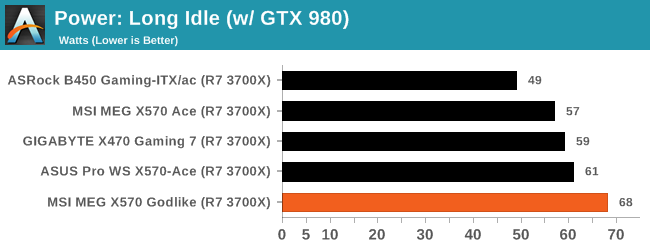
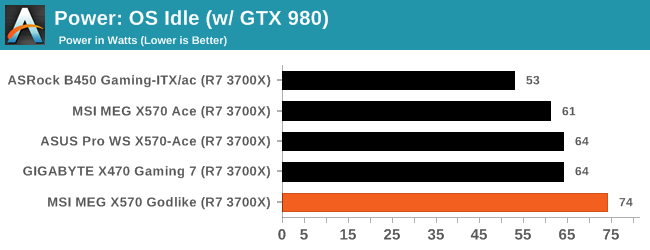
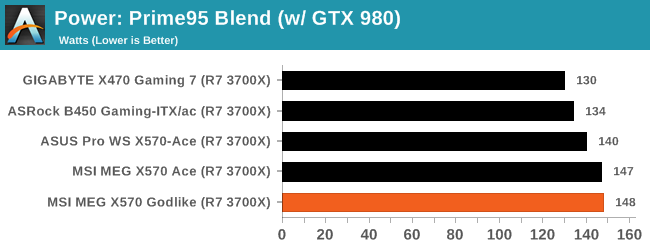
The power consumption at full load is marginally higher than the MSI MEG X570 Ace by a single watt, but in both idle and long ide power states, the power consumption is considerably higher. The larger PCB and bigger controller set are contributing factors.
Non-UEFI POST Time
Different motherboards have different POST sequences before an operating system is initialized. A lot of this is dependent on the board itself, and POST boot time is determined by the controllers on board (and the sequence of how those extras are organized). As part of our testing, we look at the POST Boot Time using a stopwatch. This is the time from pressing the ON button on the computer to when Windows starts loading. (We discount Windows loading as it is highly variable given Windows specific features.)
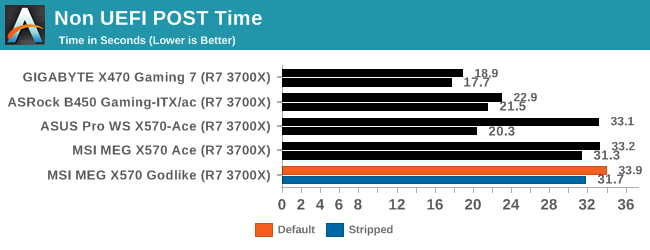
As with the MSI MEG X570 Ace model, the MSI MEG X570 Godlike also has extremely long POST times both at default settings and with controllers switched off. We did manage to make the POST time quicker by over two seconds by switching off networking and audio controllers, but this remains disappointing in comparison to other models tested with our AMD Ryzen 7 3700X processor.
DPC Latency
Deferred Procedure Call latency is a way in which Windows handles interrupt servicing. In order to wait for a processor to acknowledge the request, the system will queue all interrupt requests by priority. Critical interrupts will be handled as soon as possible, whereas lesser priority requests such as audio will be further down the line. If the audio device requires data, it will have to wait until the request is processed before the buffer is filled.
If the device drivers of higher priority components in a system are poorly implemented, this can cause delays in request scheduling and process time. This can lead to an empty audio buffer and characteristic audible pauses, pops and clicks. The DPC latency checker measures how much time is taken processing DPCs from driver invocation. The lower the value will result in better audio transfer at smaller buffer sizes. Results are measured in microseconds.
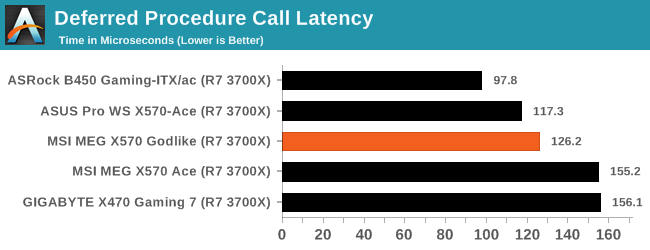
We test the DPC at the default settings straight from the box, and the MSI MEG X570 Godlike does perform noticeably better than the MSI MEG X570 Ace. The ASRock models do tend to have the upper hand when it comes to out of the box DPC latency.










116 Comments
View All Comments
inighthawki - Wednesday, August 28, 2019 - link
Depends what you're doing. The 9900K is already, at stock, anywhere from 5-10% better single core perf than AMD, and also overclocks much higher. So if you're willing to accept the additional power draw and thermal output and your goal is raw single core performance, then absolutely.If you're working in highly multithreaded scenarios then the new 3900 and 3950 chips are clearly a much superior choice.
Most people who are willing to spend this much money and OC their parts are also generally not too concerned with future proofing their systems. If you can afford (and are willing to spend) $700 on a motherboard, it stands to reason that money is not much of a concern and they probably don't care about having to buy a new motherboard for a new socket in a couple years.
StevoLincolnite - Wednesday, August 28, 2019 - link
The 9900K is only an 8-core CPU though........ AMD can trounce it with it's higher core-count parts in multi-threaded scenarios.yetanotherhuman - Thursday, August 29, 2019 - link
He does say that, and you know he hasn't edited his post, because it's not possible :DQasar - Thursday, August 29, 2019 - link
but why buy a 9900k when you can get the 3900X for the same price, use less power over all, pretty much the same IPC, and get 4 more cores on top of that ?? who cares if the 9900K can hit 5gz?? clock speed isnt everything, the Athlon 64 proved that way back when vs the P4. besides.. what if ryzen 3000 series did hit the same clocks as intel does, that would make intel's cpus look even worseinighthawki - Thursday, August 29, 2019 - link
Because the 9900K still edges out the 3900 (and presumably the 3950) in single threaded performance. Some people care about that more than having more cores.AshlayW - Thursday, August 29, 2019 - link
wow 5-10%, now tell me where that actually matters over the disadvantages of owning the 9900K vs Ryzen 3000.Oliseo - Thursday, August 29, 2019 - link
"wow 5-10%, now tell me where that actually matters over the disadvantages of owning the 9900K vs Ryzen 3000. "Compiling software for one. By it's very nature it's single threaded.
Likewise DAWs also prefer high frequency high IPC cores rather than multiple lower specced lower frequencey cores.
When you route your channels through an effects bus, that effects bus is allocated a core. It CANNOT be spread over multiple threads.
Asking silly questions like that only demonstrate your own ignorance, where you highlight you don't actually know what it is you're talking about.
It's okay though, we were all young once. I'd recommend in future putting aside your brand loyality though. It's not worth your effort, they aren't loyal to you in any shape or form.
peevee - Friday, August 30, 2019 - link
"Compiling software for one. By it's very nature it's single threaded."Seriously? You obviously missed an option or two.
29a - Friday, August 30, 2019 - link
I'm not disagreeing with you but those last two paragraphs were unnecessary. You'll catch more flies with honey than vinegar.Bus3rr0r - Friday, August 30, 2019 - link
Maybe if you are writing single module programs in your mom's basement a singel core is fine.Most devleopment projects of even relatively small projects have hundreds with larger projects running into thousands of modules. It is not only common practise to compile modules in parallel butit woudl be ridiculous not to.
The reality is there are very few applications that cannot take advantage of multi-core.
You critise others for their ignorance while demonstrating your ignorance, remarkable.